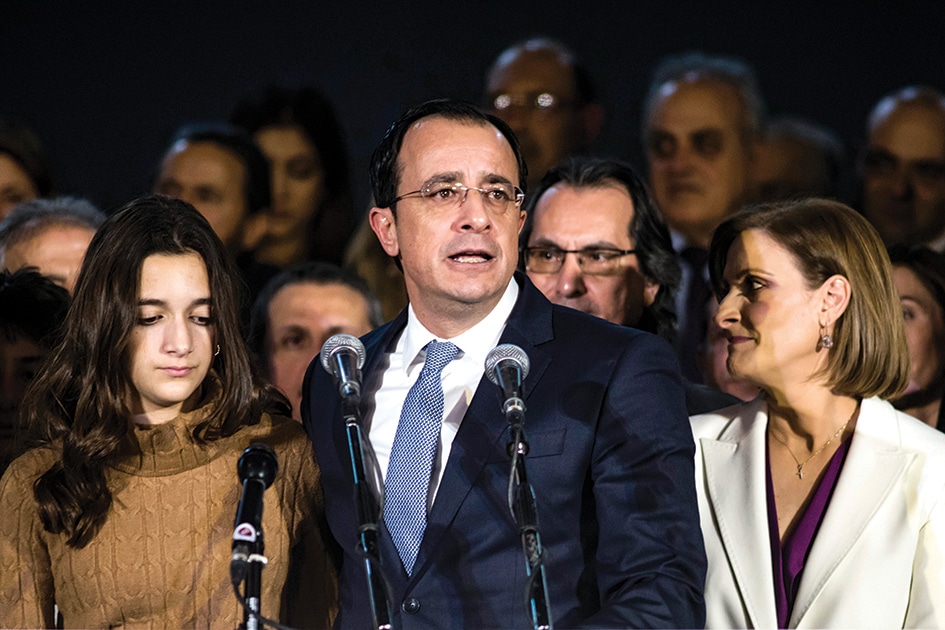NICOSIA: Cyprus voters on Sunday elected the former foreign minister Nikos Christodoulides as the next president of the small EU member state, vowing after his win to form a government with "broad social acceptance". Christodoulides, 49, won 51.92 percent to defeat fellow diplomat Andreas Mavroyiannis, 66, who took 48.08 percent, the government election service in the south of the divided Mediterranean island announced.
The vote on Sunday, a runoff after an inconclusive first round last week, means Christodoulides will succeed two-term conservative President Nicos Anastasiades. Widely tapped as the election favourite during the campaign, the former top diplomat is seen as likely to take a hard line on moribund UN-backed talks on ending the island's decades-old division.
"The current state of affairs is only worsening," Christodoulides said after results were announced. "That is why... we have a specific plan for how we will seek to break the impasse." Christodoulides, who takes up the post on March 1, said he would begin work to select his cabinet, vowing to form a gender-balanced government.
Christodoulides, who defected from the conservative ruling DISY party to run as an independent, scored 32.0 percent a week ago, against 29.6 percent for Mavroyiannis, who also ran as an independent, backed by the communist AKEL party. Mavroyiannis conceded defeat and congratulated his rival. He told reporters: "Tonight a journey has ended... I regret we couldn't achieve the change that Cyprus needed."
Rising prices
Voter turnout was 72.4 percent with over 405,000 citizens casting a ballot, a fraction higher than in the first round. Top concerns for many voters are the cost of living crisis, irregular immigration and the island's almost half-century of division between the Greek-speaking south and a Turkish-occupied breakaway statelet in the north recognised only by Ankara.
But many disaffected voters simply looked for "the least worst candidate-a characteristic in most elections, but more so in this one," said Andreas Theophanous of the Cyprus Center for European and International Affairs.
UN-backed talks on the future of the divided island, frozen for nearly six years, will be key on the new leader's agenda. Cyprus has been divided since 1974, when Turkish forces occupied its northern third in response to a Greek-sponsored coup, but voters appeared split over whether the division was a priority in the election.
While Mavroyiannis had promised during the campaign to reopen negotiations from day one, Christodoulides has demanded changes before talks are revived. EU foreign policy chief Josep Borrell said on Twitter he was looking forward to working with Christodoulides "on important files for the EU and for the people of Cyprus, paving the way towards a solution of the Cyprus issue." Greek President Katerina Sakellaropoulou called the president-elect to congratulate him, her office said, stressing "the Cyprus problem is a top national priority."
'Too many internal problems'
Retiree Dora Petsa, 75, said she expects the new president "to settle the Cypriot question". But Louis Loizides, 51, said the country has "too many internal problems" from the economy to immigration, having taken in large numbers of asylum seekers, including many who cross the UN-patrolled Green Line.
The ruling DISY had been knocked out of the presidential race for the first time in its history, and the conservative party's decision to back neither candidate threw the run-off wide open. Pre-poll favourite Christodoulides last week squeezed out DISY leader Averof Neofytou, 61, who came third with 26.11 percent in the first round, despite the incumbent's endorsement.
The new government will be under pressure to root out corruption and address higher energy bills, labour disputes and the struggling economy. Vasso Pelekanou, a 47-year-old woman, believes that the new president should help the middle class, which she believes was abandoned by the last government. "The rich have become even richer," she said. - AFP










